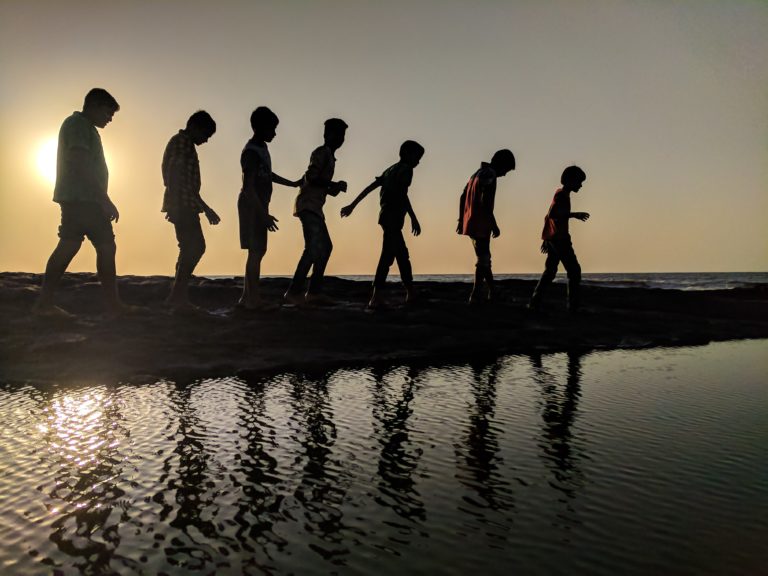Immigration and the Flight from El Salvador
Two years ago – in 2014 – thousands of unaccompanied minors poured into the United States from El Salvador, Guatemala, and Honduras. The U.S. government was unprepared. The young people from Central America and the immigration authorities were caught in what President Obama called at the time an “urgent humanitarian situation.” In 2016, another crisis at the border may be imminent.
Entire families from El Salvador are flowing into the U.S. in what could be record numbers. The number of Salvadoran families apprehended along the Mexican-U.S. border has jumped by 96 percent in only a year, and more undocumented families are coming to the U.S. from El Salvador than from any other nation.
This year, according to U.S. Customs and Border Patrol data, for every Mexican family detained at the border, ten Salvadoran families are apprehended. Salvadorans also face removal proceedings more often than immigrants from any other nation.
Why are entire Salvadoran families fleeing their homes and doing whatever it takes – sometimes at great personal risk – to make it to the United States? Observers believe that El Salvador is on the edge of civil war. El Salvador’s attorney general’s office said in August that government forces recently thwarted a terrorist scheme designed to turn El Salvador’s gang-and-drug violence against the government itself.
Prosecutors charged 78 leaders of “MS-13” with conspiring to buy high-caliber weapons in Guatemala and Mexico to attack government targets in the capital city, Managua, and across the nation.
The Salvadoran government charges that MS-13 was raising $1 million to buy assault rifles and ammo, surface-to-air missiles, bulletproof vests, and commando uniforms. The scheme, prosecutors say, was ultimately a nationwide assault to gain control of territory while disrupting El Salvador’s fragile economy and challenging the nation’s entrenched political leadership.
By targeting police officers and politicians for daily assassinations, MS-13 hoped to both incite fear in the general populace and to bankrupt the government. Basically, the rebels intended to raise the fear level dramatically in what is already one of the world’s deadliest places.
What Do Opponents of the Salvadoran Government Say?
Opponents of the Salvadoran government are insisting that the case against the MS-13 leaders is fabricated entirely for propaganda purposes and that none of the charges are true. “This is an operation of psychological warfare,” according to Paolo Luers, a former gang truce mediator and opposition political activist. Luers says the government is trying to justify the harsh measures it adopted earlier this year to crack down on gang violence and to create distrust among MS-13’s leadership.
Luers told the Fusion Media Group that the gangs would never fight a war against the government. He says even trying to launch such a war would mean “the beginning of the end” of gang influence in Salvadoran villages, communities, and neighborhoods. The MS-13’s members themselves, in a “communique” released in June, insisted that “we don’t have any interest in involving the country in war.”
Whether or not the insurgents in El Salvador are planning war, the number of Salvadoran families arriving in the United States suggests that most Salvadorans have no faith in their government to keep the peace. For these families, the risks of traveling to the U.S.-Mexico border are small compared to the danger of continuing to live in violence that could quickly turn into civil war.
Is Refugee or Asylum Status Right for You?
If you have fled from El Salvador, you may qualify for either refugee status or asylum status in the U.S. If you are currently not in the United States, you must apply for refugee status, but those who make it to the U.S.-Mexican border may apply for asylum status. Both statuses give legal protection to immigrants who are afraid to return home. Those approved for refugee or asylum status are authorized to seek work in the U.S. and may apply for lawful permanent residence – a green card – after only a year.
Not every Salvadoran will qualify for refugee or asylum status. Immigrants applying for asylum or refugee status should first discuss their particular case with an experienced Michigan or Ohio immigration attorney. Shihab Burke, LLC, Attorneys At Law has four offices in the U.S. but we work with clients from all over the world. The right immigration lawyer can also see to it that all of your legal paperwork and documents are in order, since any errors could delay approval for refugee or asylum status.
Honestly, very few immigrants are eventually approved for asylum status in the United States. Only one in twenty of the immigrants who received green cards in 2011 entered the U.S. as asylum seekers. Yet the imperative for legal protection is greater now than ever. Drug wars and gang violence dominate much of Central America, while ethnic violence and religious warfare continue to pose threats in north Africa, the Middle East, and other parts of the globe.
How Can an Immigrant Be Approved for Asylum Status?
To petition for asylum status, you must submit a USCIS Form I-589 (Application for Asylum and for Withholding of Removal) within a year of entering the U.S. Also, spouses and unmarried children under age 21 already in the United States may be included in your petition.
After a year, those granted asylum may apply for a green card by submitting USCIS Form I-485 (Application to Register Permanent Residence or to Adjust Status). You must submit a separate Form I-485 for a family member who was granted derivative asylum on the basis of your own case.
You’ll have to wait 150 days – or until your asylum status is approved, whichever comes first – to apply for employment authorization. After 150 days, if no determination regarding asylum status has been made, you may petition for work authorization by submitting USCIS Form I-765 (Application for Employment Authorization). Make sure that an experienced Michigan or Ohio immigration attorney helps you with the application forms and other legal documents.
Historically, the United States has been a beacon of hope to immigrants everywhere who seek a better life for themselves and their families. Immigration law in the United States is exceedingly complex and in need of reform. But with a bit of patience, some effort, and sound legal advice from the right immigration attorney, most immigrants can move ahead successfully with their plans for a better life in the United States.
Need Help?
We encourage you to seek the guidance of the experienced immigration attorneys at Shihab Burke, LLC, Attorneys At Law to address any questions you may have about your specific immigration case.
Contact us today! We are here to help.






